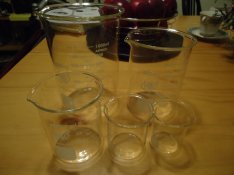handle2001
Member
Hi All!
I ordered a bunch of stuff from B&H yesterday to get started developing my own black and white film. I'm starting off with Ilford chemistry since I'm shooting with Ilford film. I ordered a set of borosilicate graduated beakers from Amazon that comes with 1000, 600, 250, 100, and 50mL beakers. I read somewhere before that people often use 16oz plastic cups for holding working solutions, so I didn't think having four 1000mL beakers would be necessary (I need 600mL of each working solution to develop two 35mm rolls at a time), but now I'm curious if using the same graduate to mix up the developer as the fixer is going to deplete the fixer quicker than otherwise? Or will mixing up the stop solution in between mitigate this?
I ordered a bunch of stuff from B&H yesterday to get started developing my own black and white film. I'm starting off with Ilford chemistry since I'm shooting with Ilford film. I ordered a set of borosilicate graduated beakers from Amazon that comes with 1000, 600, 250, 100, and 50mL beakers. I read somewhere before that people often use 16oz plastic cups for holding working solutions, so I didn't think having four 1000mL beakers would be necessary (I need 600mL of each working solution to develop two 35mm rolls at a time), but now I'm curious if using the same graduate to mix up the developer as the fixer is going to deplete the fixer quicker than otherwise? Or will mixing up the stop solution in between mitigate this?








 )
)



